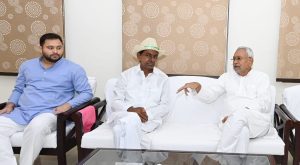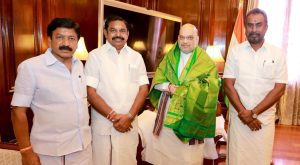If the non-BJP parties were to come together on a programme/policy consensus rather than focus on the leadership sweepstakes, it would make the possibility of a viable alliance emerging much stronger.

The chief minister of the five southern states at the 76th Independence Day celebrations in their respective states. (From left) BS Bommai (BJP, Karnataka), K Chandrashekar Rao (TRS, Telangana), YS Jagan Mohan Reddy (YSRCP, Andhra), Pinarayi Vijayan (CPM, Kerala), and MK Stalin (DMK, Tamil Nadu). Except for the state of Karnataka, the BJP has been unable to come to power in the remaining four states of the South (Supplied)
If one were to notice the spread of the political footprints of the BJP, its securing a majority on its own in the 2014 Lok Sabha elections had a lot to do with its spectacular electoral performance in North, Central, and Western India. In 2019, it expanded this political presence to the East and Northeast. It is clear that in 2024, the focus of the BJP would be on the states in South India.
Except for the state of Karnataka, the BJP has been unable to come to power in the remaining four states of the South.
Even in Karnataka, while the party has come to power, it has been unable to win a clear majority in the state elections. It is clearly aiming at reaching this milestone in the 2023 Assembly elections and faces a formidable challenge from the Congress.
It is important to note that Karnataka is the only state in the South where the direct contest is between the BJP and Congress, with the JD(S) relegated to a distant third position. In the rest of the states of South India, the competition is between two well-entrenched alliances (Kerala); between alliances led by state-based parties (Tamil Nadu); between two state-based parties (Andhra Pradesh); and between a state-based party and the BJP (Telangana).
The nature and structure of the contests in the South are critical to explaining the challenges that the BJP faces in expanding its political presence in the region.
In this narration, one is specifically using the term “state-based” parties rather than regional parties. Similarly, the term “multi-state” parties appears more relevant than national parties. A crucial role in the creation of a non-BJP, non-NDA alliance is linked to the strategies adopted by the state-based parties in the southern, eastern, and northern regions of India.
In the South, this assumes even greater significance in the backdrop of the limited presence of the BJP in this region. While the BJP has clearly emerged as the key challenger to the TRS in Telangana, it is a mere junior partner in the AIADMK-led alliance in Tamil Nadu. In Kerala, it is still to create a political splash in an entrenched bipolar contest. In Andhra Pradesh, it has been relegated to the political margins amid the contest between two state-based parties.
Given the near-straight fight between the TRS and BJP in Telangana, it is inevitable for the former to align with the forces ranged against the ruling party at the Centre.

(From left) Tejashwi Yadav, KCR, and Nitish Kumar in Patna, Bihar, on Wednesday, 31 August 2022 (Supplied)
The challenge that the TRS faces is where and how it positions itself within the anti-BJP alliance. Given the fact that there has been much attention being focused on the leadership factor within these forces, the TRS leadership has been compelled to adopt a posture of ambivalence.
If the non-BJP parties were to come together on a programme/policy consensus rather than focus on the leadership sweepstakes, it would make the possibility of a viable non-BJP alliance emerging much stronger and ensure it is sustainable.
In Tamil Nadu, the DMK-led alliance is clearly making a strong pitch for the emergence of an anti-BJP alliance.

Former Tamil Nadu chief minister Edappadi K Palaniswami (second from left) with Union Home Minister Amit Shah (second from right) in New Delhi on Tuesday, 20 September (Supplied)
The challenge that the BJP faces in this state is the weakness and internal strife in the leader of its alliance — the AIADMK. The BJP was hoping for an alternative leader with visible charisma to emerge before the last Assembly elections. When this did not happen, the BJP was left with no choice but to align with the AIADMK-led alliance.
Given the internal crisis within the AIADMK, the BJP hopes to play a more meaningful role in the alliance and in the process directly take on its key challenger in the state.
In Andhra Pradesh, the BJP is caught between two political stools in the competition between the YSRCP and TDP. While the TDP has been an old ally, the relationship has always been problematic and inevitably collapsed in the long run.
There are fundamental ideological differences between the BJP and YSRCP, which makes any possible alliance unlikely. While the YSRCP has offered selective support to the BJP-led government at the Centre (especially in the two Houses of Parliament), it does not necessarily imply that an alliance is either possible or likely.
This leaves the two state-based parties increasingly focusing on registering their electoral presence in the state. This gains even more relevance with a simultaneous poll for the Lok Sabha and state Assembly being likely.
In Kerala, the immediate future (at least till the 2024 elections) is unlikely to see the BJP break the stranglehold of the bipolar alliance system. While its vote share has increased, it has not been able to transfer the same into seats, given the direct contest between the two alliances. The subsequent Assembly elections could see some realignment and may have wider implications for the tight bipolar contest.
In the run-up to the next Lok Sabha polls, there are crucial Assembly polls in Karnataka and Telangana. The BJP has a critical stake in both. It faces a direct fight with the Congress in one and the TRS in the other. The results of these elections will clearly have a bearing on the stand of the state-based parties in South India in the 2024 Lok Sabha polls.
(Sandeep Shastri is a student of Indian politics in general and Karnataka politics in particular for the last four decades, and the national coordinator of the Lokniti network. These are the personal views of the author)

Apr 26, 2024

Apr 26, 2024

Apr 26, 2024

Apr 25, 2024

Apr 25, 2024

Apr 25, 2024